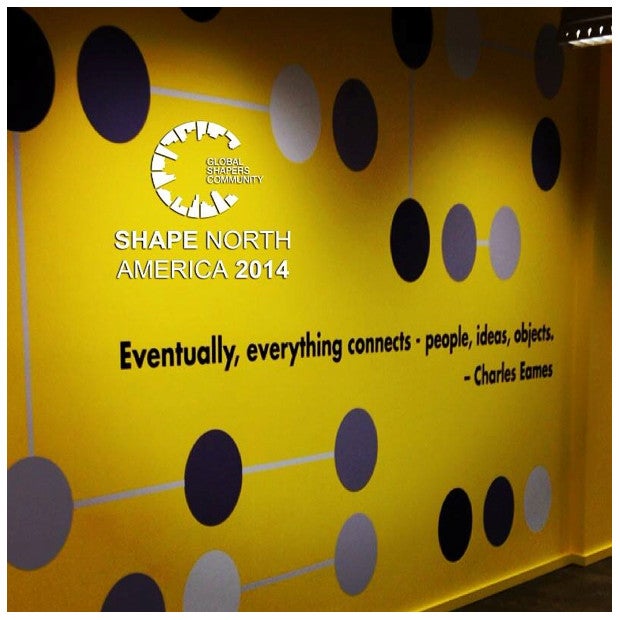On June 18-21, I traveled to Detroit, Michigan for a Global Shapers forum: ‘Shape North America’. It brought young ‘Global Shapers’ in the USA, Canada and the Caribbean together, with a goal of ‘inspiring and convening innovative systems thinkers who believe in sustainable, socially just, creative, and prosperous communities’. Participants developed a series of action plans to engage in and activate local social and economic movements in Detroit and across the planet.
Shapers got to network with business and community leaders of Detroit (including the Mayor’s Chief of Staff, the Coca-Cola Company and the Ford Motor Company – to name just a few!), some of the management of the Global Shapers initiative, including the Sr. Director for North America and Special Advisor to the Chairman of the World Economic Forum (USA) and most importantly, each other!
 A few of the Caribbean Shapers representing Guyana, Barbados, The Bahamas and Jamaica! (Suriname and Trinidad & Tobago were there too!)
A few of the Caribbean Shapers representing Guyana, Barbados, The Bahamas and Jamaica! (Suriname and Trinidad & Tobago were there too!)
Sessions were organized around several focused topics including: i) Building Our Shaper Community ii) Building Resilient Cities iii) Responsibility to our Global Community and iv) Applying Global Shaper Thinking. I’d like to tell you a bit about this last session, which included my first ever ‘hackathon’. The Shapers were split into 8 groups that were charged in four hours to identify a challenge, a viable implementation plan and a solution to be adopted by every hub represented. The prize was $1,000 to execute the project! My group, #8, included representatives from Georgetown, Guyana, Nassau, Bahamas, San Juan, Puerto Rico, Seattle, Washington, Toronto, Ontario and Washington, D.C.
Immediately we agreed that the theme of sustainability in the context of compost management was a relevant global issue for each of the hubs. A presentation about a local barbershop in Detroit, Social Grooming Club, which reuses the hair collected for compost to plant trees, inspired our initiative.
Our challenge statement: “We are flushing away our waste with potable water every time we use our toilets”. What if we could provide rich organic compost with what we once considered waste for the growing global movement of urban farming? Our Solution: Re-shape the public’s perception regarding composting toilets and their benefits, which will lead to an increase in availability and usage of these toilets. Our hashtag (for social media purposes) was #igiveacrap.
 Group 8 facilitating Q&A after the presentation and launch of our #igiveacrap campaign
Group 8 facilitating Q&A after the presentation and launch of our #igiveacrap campaign
A recent article by the National Geographic entitled: “Is ‘peecycling’ the next wave in sustainable factor?” states that human waste can be converted into valuable fertilizer, once people get past the ‘ick’ factor. What if we got past the psychological hold up of human waste, and beyond the misunderstanding that it smells? Although my group didn’t win the prize, the proposal was well received and we are considering other options for financing this pilot project.
According to research by the Rich Earth Institute, each year a person produces nearly enough fertilizer to grow one year’s worth of food. Generally, we flush our waste, using four thousand gallons of water per year, per person. #Igiveacrap is an educational campaign and community-based project which will redefine the way we think about our waste by advocating for a paradigm shift towards seeing the worth of human waste. What is “crap” good for? The concept is so simple, there’s no reinventing the wheel. I feel it is a project that, if given the necessary attention, can certainly be adapted in countries within the Caribbean.
I’ll be writing much more about this eye opening experience. The venue itself, Tech Town, is fomenting innovation and creativity and the Detroit Future City Strategic Framework story needs to be told. I wasn’t prepared for the amount of inspiration I’d receive from my participation at Shape North America, and would have never imagined the similarities between Detroit and The Bahamas. Needless to say, there were many lessons learnt and best practices to share!
 At the end of the ‘hackathon’ presentations, Shapers group photo by Sarah Peerani and Natalie Bethel
At the end of the ‘hackathon’ presentations, Shapers group photo by Sarah Peerani and Natalie Bethel
To learn more about the Global Shapers, an initiative of the World Economic Forum, visit: http://www.globalshapers.org/


Leave a Reply